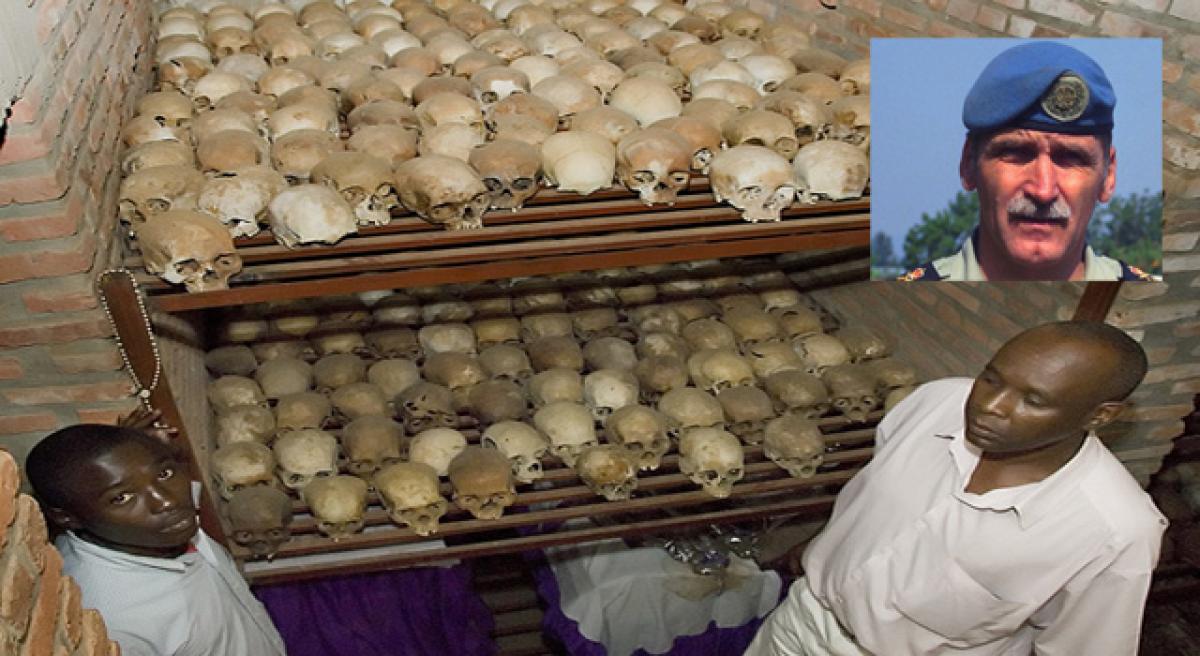Live
- Slur against Kumaraswamy wrong, Minister Zameer will be corrected: K’taka Cong
- Australian towns ordered to evacuate amid bushfire threat
- BJP backs LG's crackdown on illegal immigrants in Delhi
- AMR a global health threat, requires urgent action via one health approach: Anupriya Patel
- BJP planning big communal clash; we will expose them after Maha polls, says K’taka DyCM
- Sharad Pawar makes a soul-stirring plea 'to regain the glory of progressive Maharashtra'
- Seven soldiers killed in attack on Pak military camp in Balochistan
- ICC announces 2025 Men’s Champions Trophy tour to begin in Islamabad
- Americans increasingly vote along class lines, not racial ones: Report
- Chandrababu's brother Rammurthy Naidu Passes Away in Hyderabad
Just In

In the Rwandan genocide most victims were the minority Tutsis, but moderates of the Hutu majority were not spared, and the perpetrators included their long-standing friends, neighbours and sometimes families too. Meanwhile, the world not only remained passive but also hindered those in a position to make some difference.
In the Rwandan genocide most victims were the minority Tutsis, but moderates of the Hutu majority were not spared, and the perpetrators included their long-standing friends, neighbours and sometimes families too. Meanwhile, the world not only remained passive but also hindered those in a position to make some difference.
There can be few more shameful instances for the global community, and its representative organisation, the United Nations, which did not cover itself with much glory in the early 1990s - remember Bosnia?
It was, however, more humiliating for its peacekeepers in the United Nations Assistance Mission for Rwanda (UNAMIR), a manifestly insufficient force not only rendered ineffective by apathy and competing agendas, but its members forced to forsake their military honour, as its Canadian commander recounts in harrowing and heart-breaking detail.
There is no dearth of work on the Rwandan genocide - Alison Des Forges' ‘Leave None to Tell the Story: Genocide in Rwanda’ (1999), Philip Gourevitch's ominously-titled but most disturbing ‘We Wish to Inform You That Tomorrow We Will Be Killed with Our Families: Stories From Rwanda’ (1998) while Samantha Power's ‘A Problem from Hell: America and the Age of Genocide’ (2002) provides the American response,
Michael Barnett's ‘Eyewitness to a Genocide: The United Nations and Rwanda’ the failure of the UN during the crisis and Shaharyar Khan's ‘The Shallow Graves of Rwanda’ (2000) its continuing failure to help the survivors.
But Lt Gen Romeo Dallaire's account is especially piquant - for his honest and candid portrayal of his helplessness, despite his best efforts, in the face of a monumental tragedy that could have been averted, or at least mitigated, with a little courage and concern by responsible nations.
‘Shake Hands With The Devil: The Failure of Humanity in Rwanda’ (2003) is his "story of what happened in Rwanda in 1994... a story of betrayal, failure, naiveté, indifference, hatred, genocide, war, inhumanity and evil".
Dallaire says he regrets not writing it earlier despite requests and trying to "find some respite" from his harrowing memories, which instead took him into "a disastrous mental health spiral that led me to suicide attempts, a medical release from the Armed Forces,
the diagnosis of post-traumatic stress disorder..."
It was only after he retired in 2000 that he began work on it, and the title comes from his response to a Canadian military padre, who asked Dallaire how he could still believe in God after all he had seen and witnessed - "I know there is a God, because in Rwanda I shook hands with the devil...."
Beginning with the surreal experience of coming across a young oblivious infant in a forested area and finding what he thought a home still had the decaying bodies of his massacred parents and other siblings, Dallaire paints how the UN and the world ignored, or even abetted the genocide.
But he could have well discerned the outcome in the penny-pinching ways of the UN bureaucrats, the perceived partiality of its civilian representative (former Cameroonian foreign minister Jacques-Roger Booh-Booh) and some unique ways of his troops. The Belgian troops of UNAMIR lived separately around the town since it was their policy that in Africa, their soldiers would not live under tents "because it was imperative that they maintain a correct presence in front of Africans".
Dallaire came to know about the impending genocide in January and given locations of the arms caches but permission to seize them was denied by his UN bosses and he was rebuked for even considering it.
As the genocide started in April, 10 Belgian peacekeepers were disarmed and murdered - prompting Belgium to pull out their troops. The UNAMIR, soon reduced to a 10th of its strength even as Dallaire pleaded for more troops to fulfill its mandate, could save some lives but were mostly spectators - thought there were heroes like Sengalese military observer, Captain Diagne Mbaye, who spirited murdered Prime Minister Agathe Uwilingiyimana's children to safety.
Dallaire was scathing about the Belgian withdrawal - remembering his own father and father-in-law had fought for liberation for Belgium in World War II while it was despoiling its African possessions like Rwanda and "now he was watching Belgian troops abandon us" only because "they had lost some of their professional soldiers to soldierly duties".
But who all could he blame? As he tells us: "Engraved still in my brain in the judgment of a small group of bureaucrats who came to 'assess' the situation in the first weeks of the genocide: 'We will recommend to our government not to intervene as the risks are high and all that is here are humans."
What else need be said to reveal what the "civilised, powerful" world thought? Has it changed since 1994?
By: Vikas Datta

© 2024 Hyderabad Media House Limited/The Hans India. All rights reserved. Powered by hocalwire.com







